It’s been already 9 months and 10,000 kilometers we are living across Japan in our small camper van. We are a mixed couple (European/Japanese) with a 1 year and a half kid. As a lot of people are curious about our experience, I’ll try to cover everything you might want to know before getting into van life in Japan or renting a camper to visit the country.
TLDR: Japan might be one the best country in the world for vanlife!
✅ Safety
✅ Free parking & clean toilets
✅ Diverse Nature
✅ Good food + cheap restaurants
❌ Trash
❌ Campsites can be expensive and have strict rules
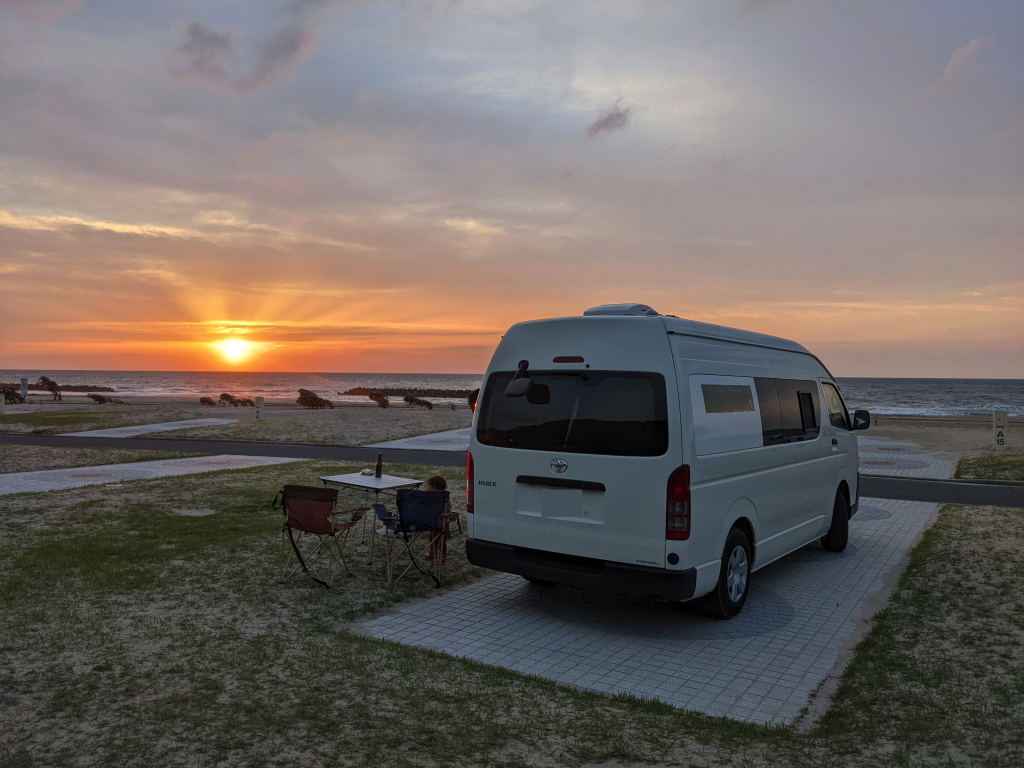
How do you end up living in a van?
I always love traveling, exploring, and camping. After spending the first corona year in Europe we decided to come back to Japan (mixed couple (European/Japanese) with a 1 year and a half kid). We already lived a few years in the Tokyo area but wanted to experience living in the countryside. As we didn’t know where. We thought that getting a van and going everywhere until we find our paradise is the solution. I always dreamt about the idea but..
It was a hard choice: moving in a van with a small kid, there was an upfront investment, changing our lifestyle…
But if I had to do the same choice again, I’ll do it for sure!
It’s definitely not for everyone! It’s sometimes super tiring but the magic of waking up every day in nature and discovering new places has no price.
What van do you use?
We are the lucky owners of a Kuma Q built by DreamDrive. It’s based on the Toyota Hiace Super Long and we love it. The van features a full-size bed, a kitchen a ton of storage. The living size is quite small compared to USA/European vans but just enough for us to live and store our things. It’s also built with wood using natural paint which is pretty important for us living full-time with a small kid.
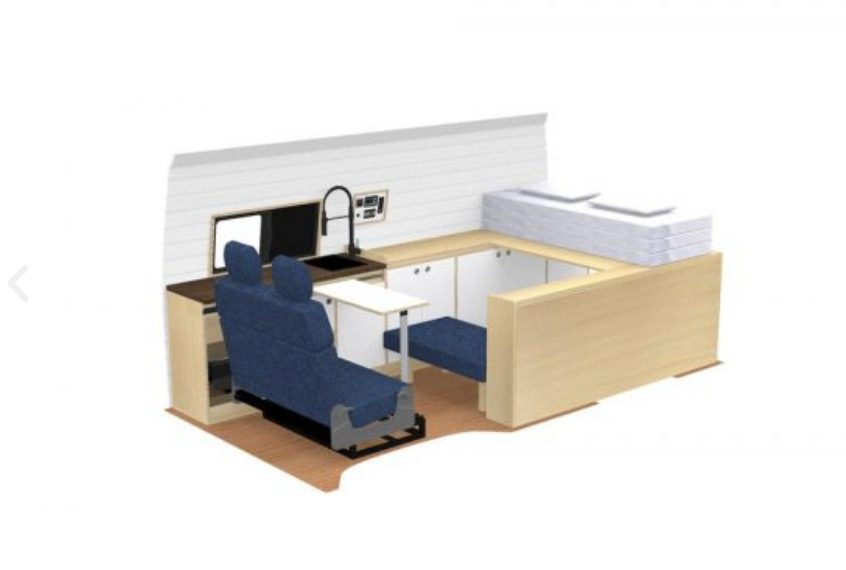
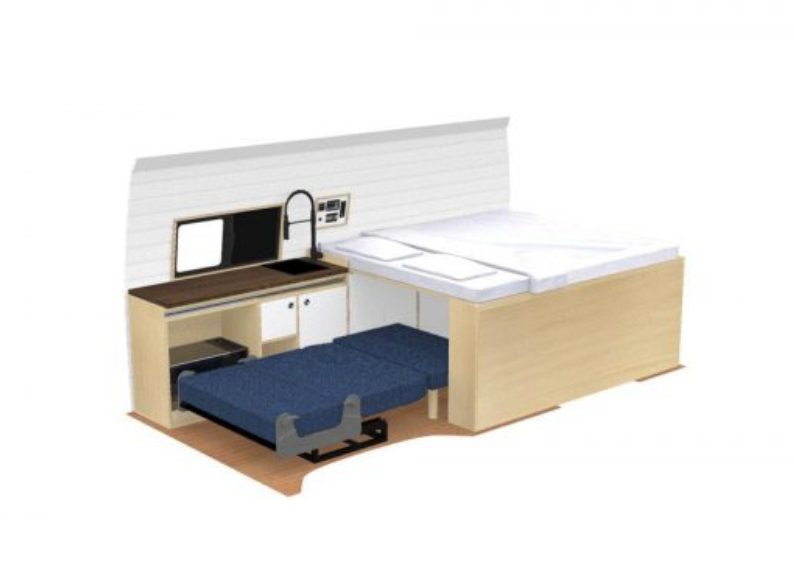
We added some temporary storage under the bed to store clothes/food and kid’s toys and here are some photos when it’s fully loaded:
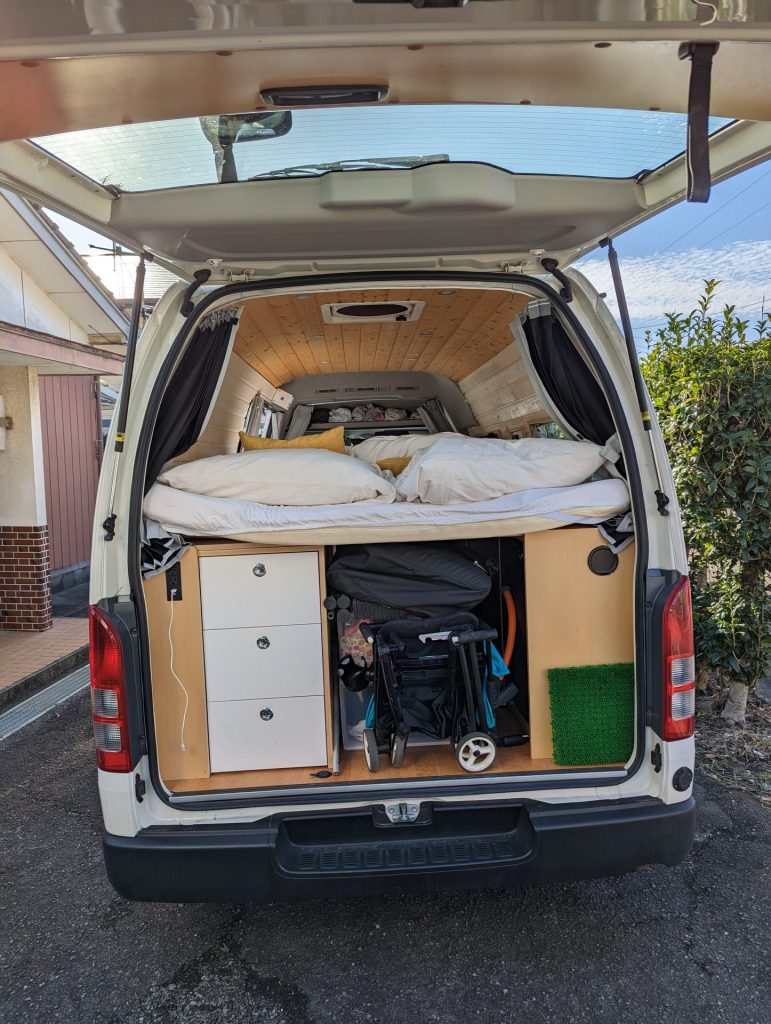
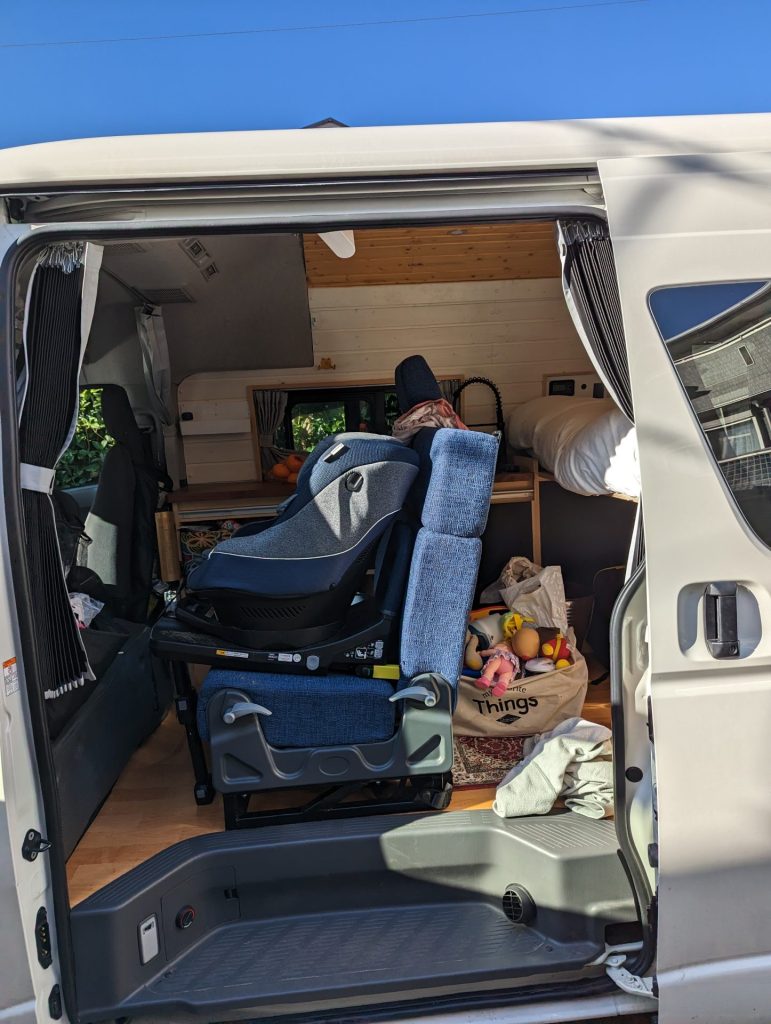
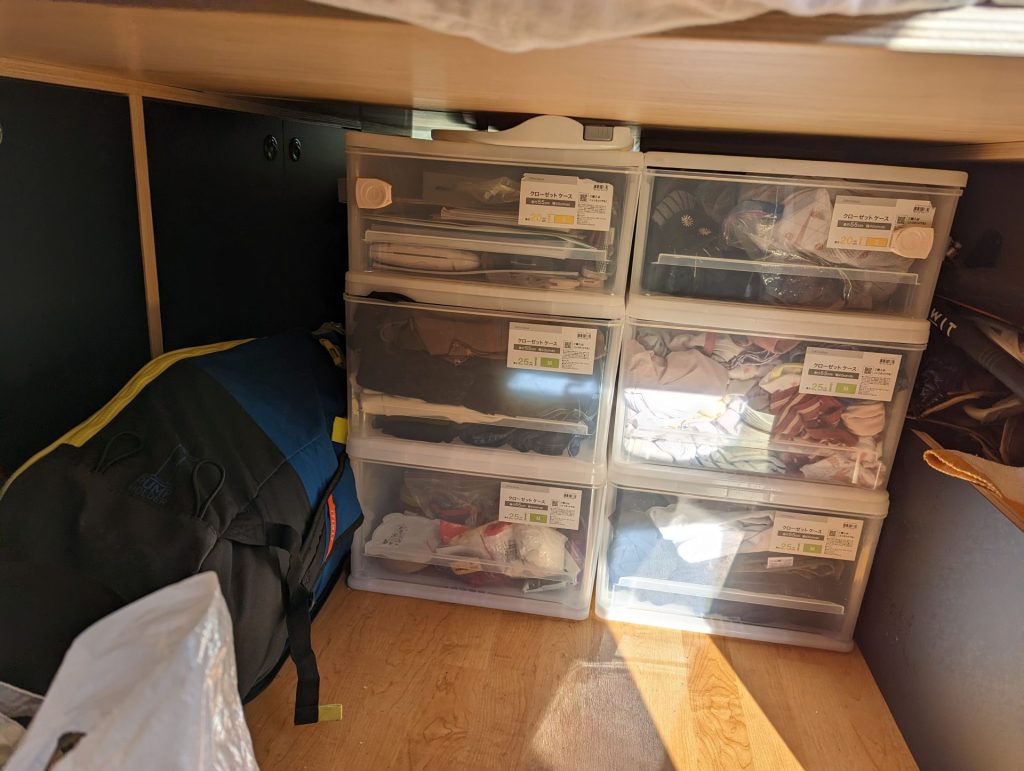
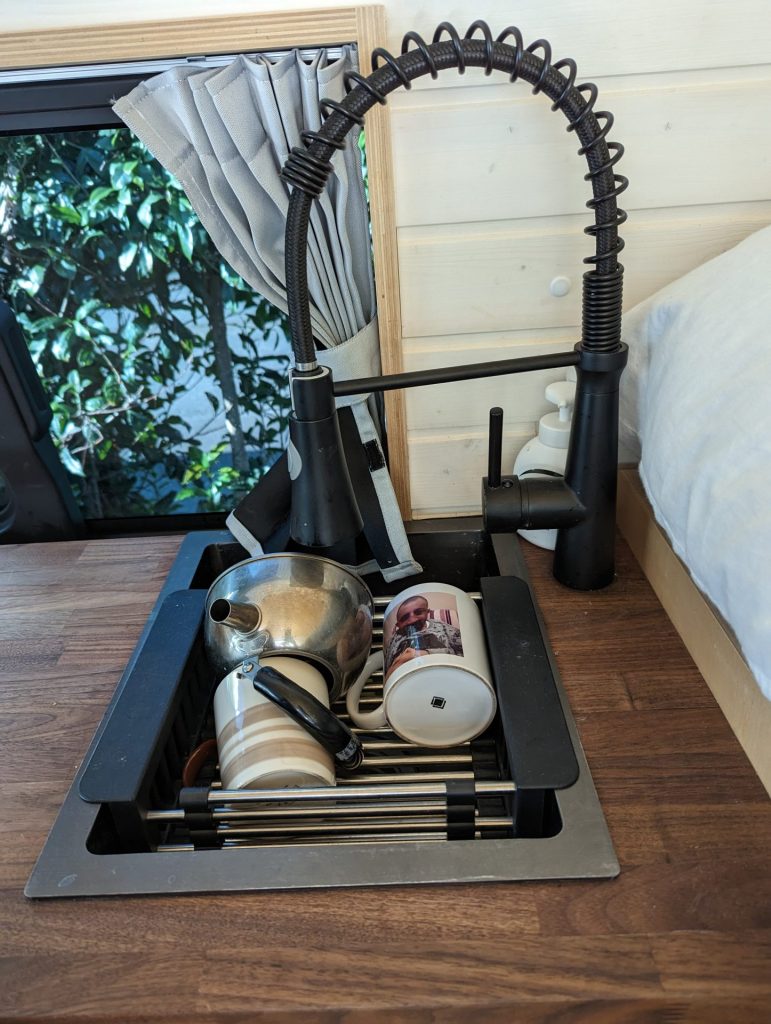
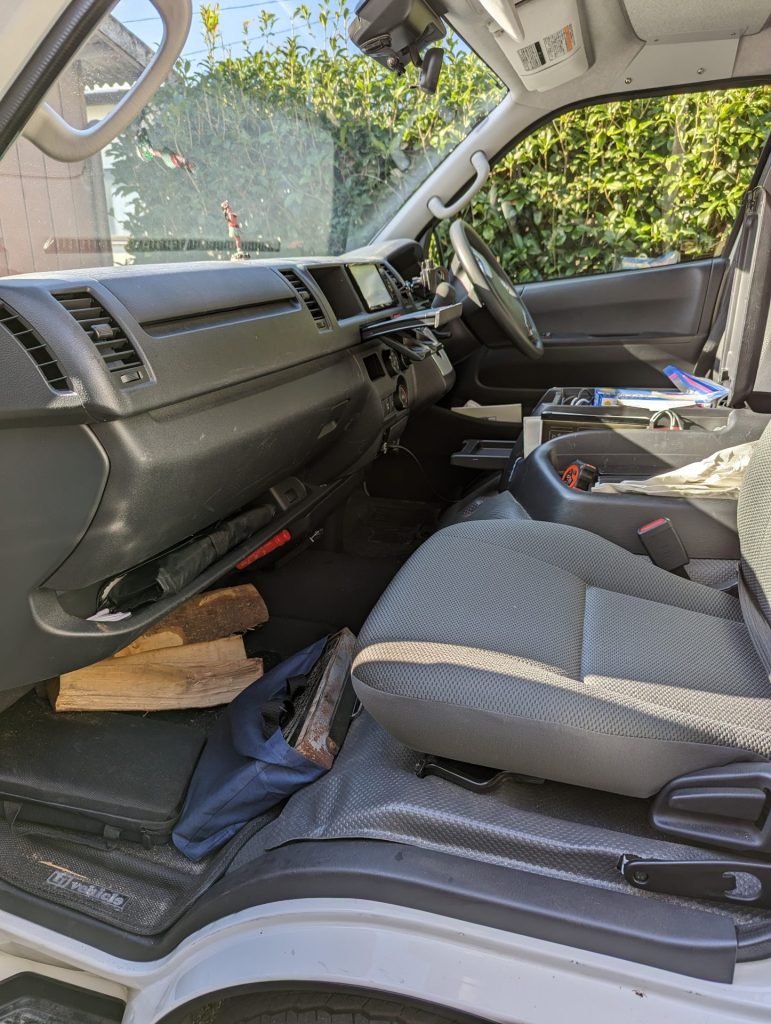
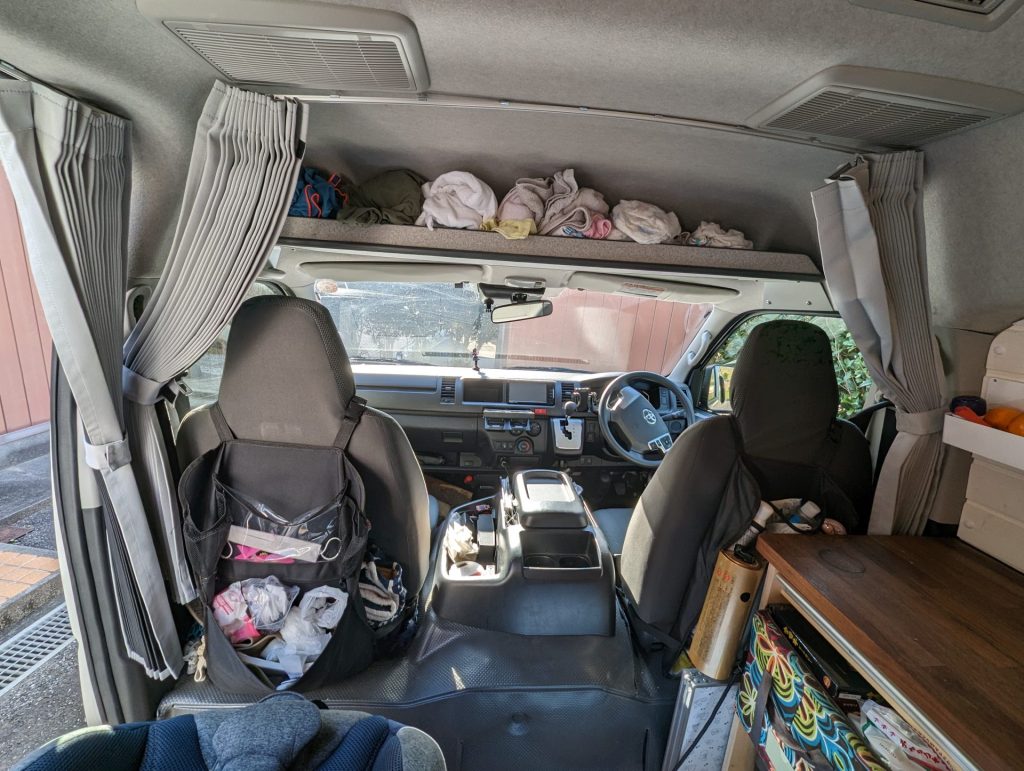
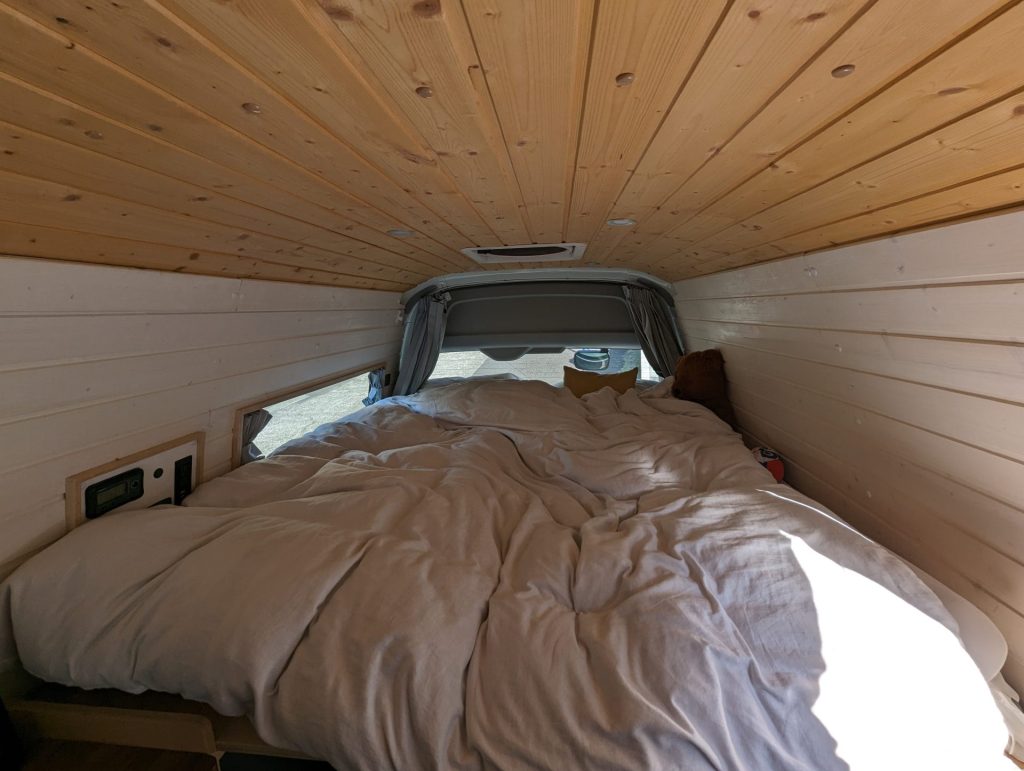
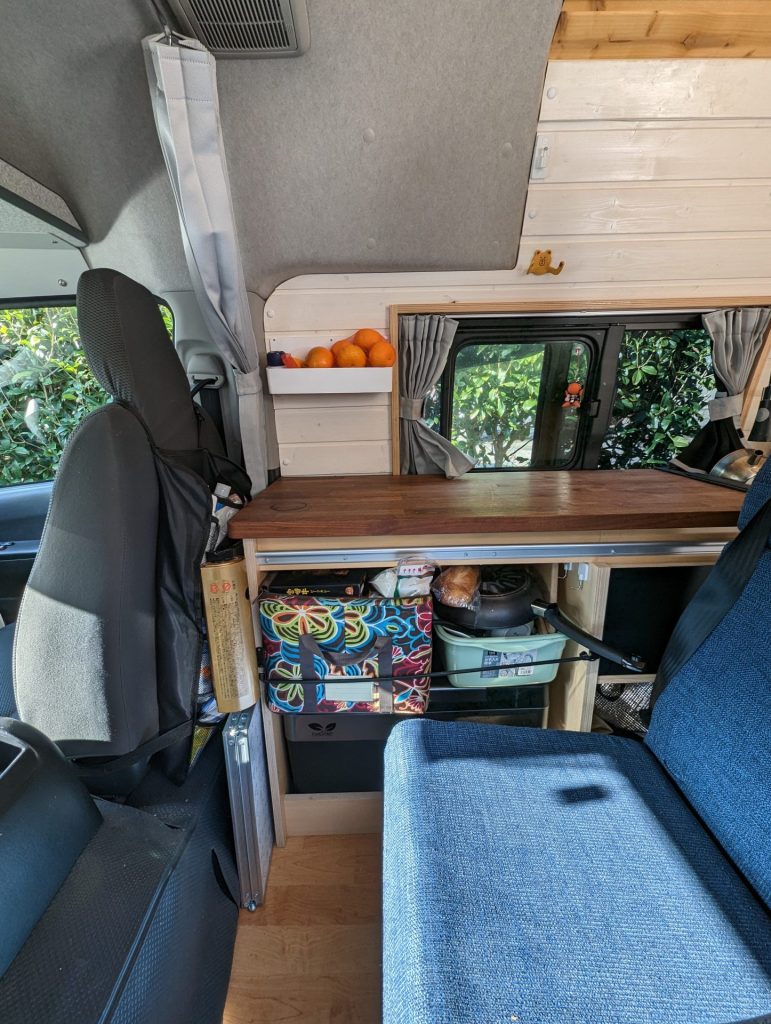
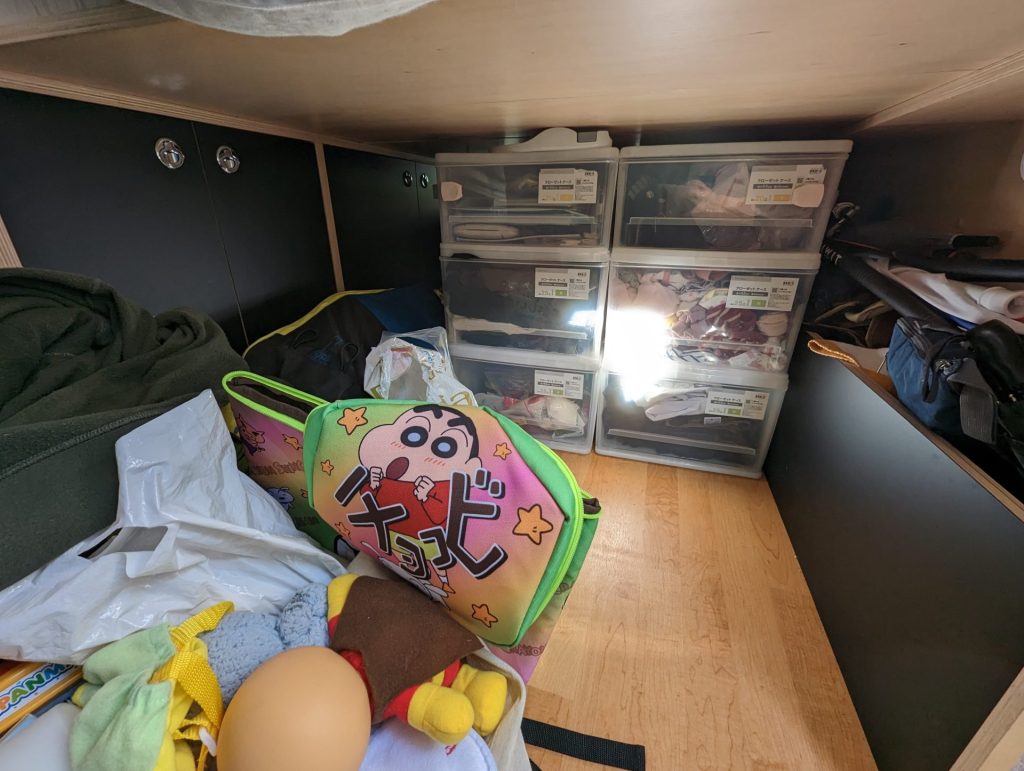
In the evening we move the baby seat to the front passenger seat and put the behind seat flat. We use it as a tatami area when eating on a small camping table.
To see what campers and vans are usually used in Japan you can check Camp no Fuji.
Where do you travel?
We mainly travel along the coasts and through mountains always avoiding big cities. Japan offers a super rich nature, small villages that conserve their unique atmosphere with little shops and restaurants ready to warm you up. Even if we tend to never sleep 2 times at the same place, we travel slowly to get time to work and explore a lot by walking to discover the small details.

Our favorite prefectures are Miyazaki, Oita, Yamaguchi, and Shimane.. We unfortunately didn’t have time to explore the north yet.
Where do you sleep?
We usually spend nights in 3 type of places depending on where we are and which is the best:
Free public parking (70%)
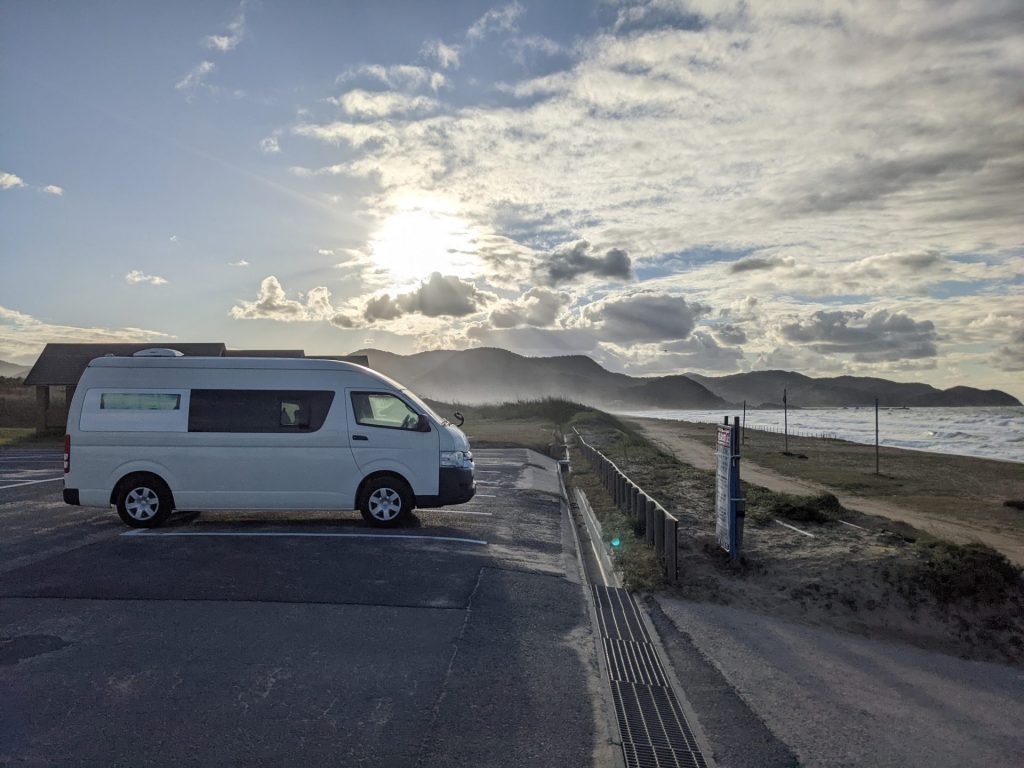
Most of our nights are spent on free public parking that often has toilets. They are often stated near parks, beaches, rivers, and tourist attractions.. We often find ourselves being the only one spending the night there. We usually park just before sunset and leave after breakfast and don’t settle anything out of the van while using them.
Campgrounds (20%)
There is a lot of camping in Japan that accepts camper vans and RVs. We only use campsites when we find ones with great natural spaces. We usually avoid weekends and spend several days in a row so we can relax, set up outdoor tables/chairs, and tarp and grill things on our BBQ.
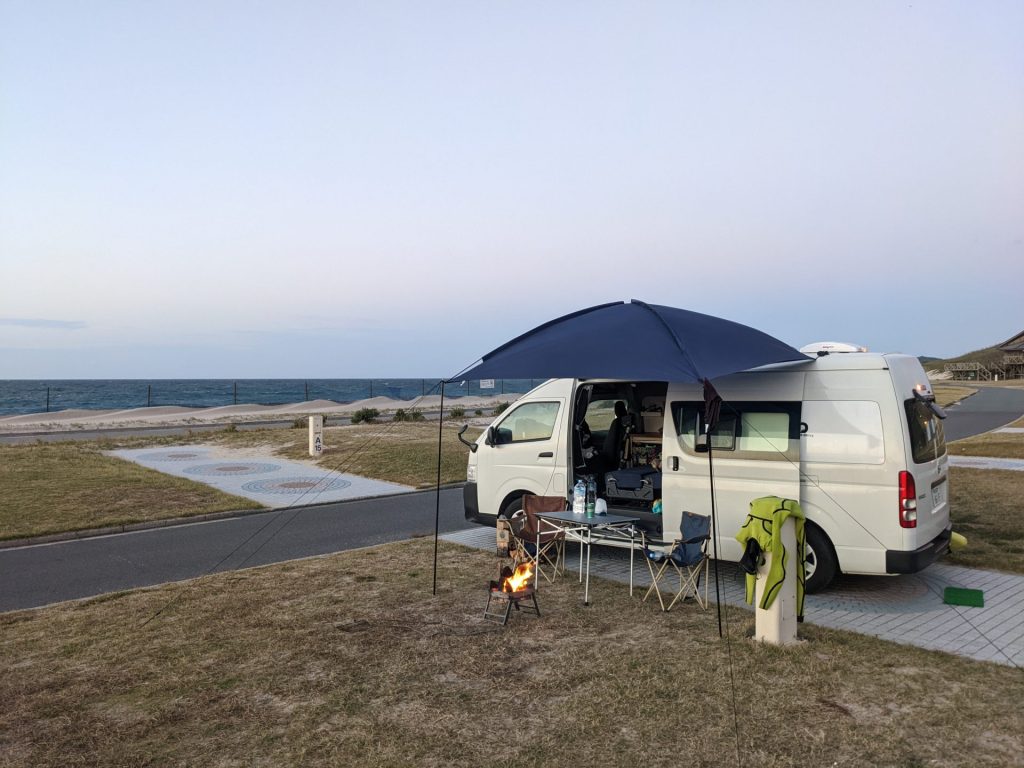
Camping in Japan can be expensive thought but are also a great opportunity to dump trash and refill/empty the water.
Michi no eki (10%)
Michi no Eki (道の駅) are roadside stations that you can find everywhere in Japan. In the countryside, they are often seen as a hub that connects local people and travelers with some shops offering local products, and restaurants. Some of those even have public baths (onsen 温泉). Even if they often offer a lot of comforts. they can get really crowded and noisy on weekends. A lot of truck drivers or young people spend all night with their engines on while sleeping/watching movies on their cellphone. We also once woke up in the middle of a car meeting on a Saturday night while it was empty when we went to bed..
When we find good offers or the weather gets hard for several days we don’t hesitate to stay in Ryokans found on booking.com. It’s also a good way to relax and have food made for you.
When visiting big cities like Osaka, Kyoto: we stay in short-term rental apartments/houses found on booking.com/Airbnb
Here are a few links that have good resources for places to sleep:
- Google Maps of free camping and hot springs with Michi no Eki
- Michi Japan Road Guide Offline (iOS app)
- Japanese blog about Free & Cheap Camping Information
🚽Toilets?
Our van doesn’t have toilets, considering how difficult it is to dump trash I wouldn’t recommend using your own toilets while traveling. Japan has a lot of free public toilets. They are usually really clean and can be found in public parking, Michi no eki or convenience stores. When sleeping in nature we do sometimes pee outside.
An empty water bottle/adult diaper can sometimes be useful in the middle of the night to avoid putting on your clothes/shoes and exiting the van in the cold weather.
Japanese toilets are amazing and you can check some of my best findings here.
🚮 Trash?
Japan has a lot of rules for trash sorting and it can be sometimes hard to deal with trash. We recommend throwing things little by little as soon as you encounter trash. We had some tricky situations as baby diapers are quite smelly and Japanese food is often wrapped in a lot of plastics. Some prefectures/towns have strict policies and it’s hard to find places to throw away things legally. Convenience stores have also trash box you may use but keep in mind that they are only intended for products from the store itself.
On paid freeways service areas there are always trash boxes. We found ourselves sometimes taking the freeway just for the goal to empty our bags..
🚰 Water?
It has been pretty easy to find clean water. We have a 23L reserve of clean water that we mainly use for dishwashing. You can often find water taps near beaches, parks, or behind public toilet buildings. It may be interesting to buy a key for using water taps as they are often removed (you could get in trouble for doing so..):
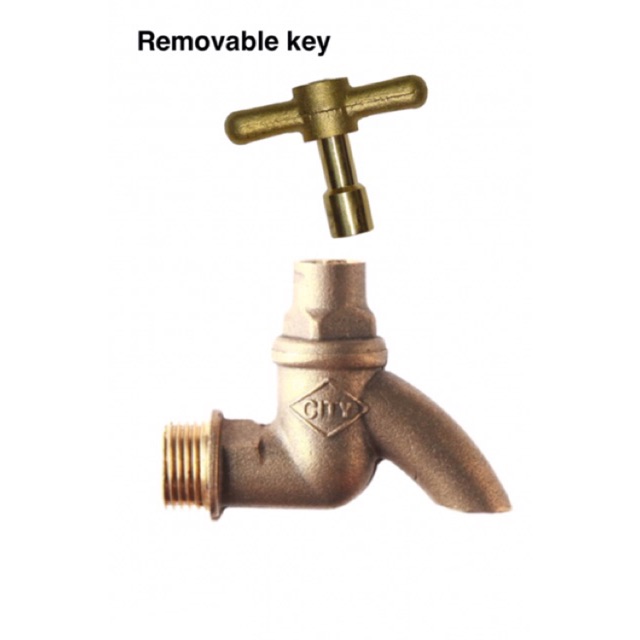
In case you don’t find free water, campings always have it.
We drink and cook using water from bottles bought in supermarkets/drug stores. (Water is way cheaper in big supermarkets than in convenience stores).
Our dirty water tank is 23L too and we empty it most of the time in rain drains. The water only contains tiny food/ecologic dish soap.
🔌 Electricity?
Our van has 2 Lithium 100AH batteries and a solar panel. As we drive often and Japan is a country pretty sunny we never had a problem so far staying charged. The biggest energy consumption we have is a small rice cooker and laptops.
🛁 Bathing?
Same as toilets we don’t have any showers in the van. We do have an external shower that we only use for small washing after the beach. Japan offers a lot of Onsens and Sentos. You can also sometimes visit Ryokan baths as a day visitor, or find onsens in remote nature.. Here is a website in Japanese that list some mixed onsens often free and located in complete nature.
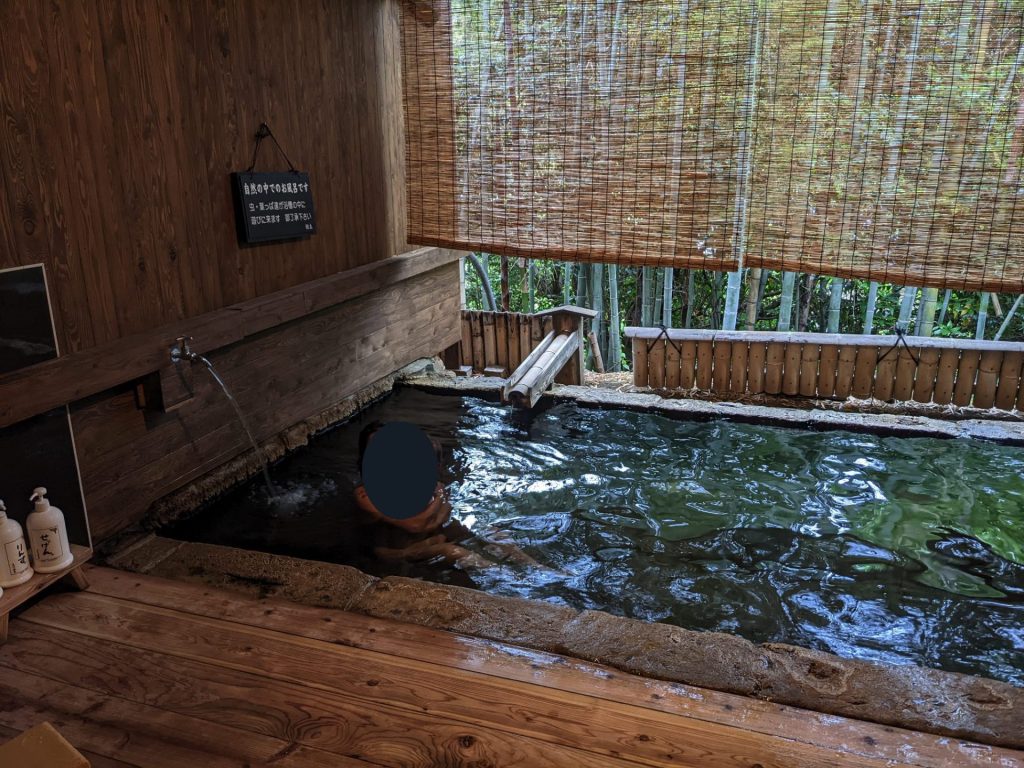
We usually don’t bathe every day and listen to our body’s needs. It’s easier to stay clean during the winter than in summer which can be really hot and humid.
In case it’s hard to find a public bath you can always opt-in for a visit to some Manga Cafe. They are located everywhere in Japan even in small cities and are open 24/24 and often have a shower. (the atmosphere can be creepy for a family visit as it’s often only males staying there reading books and browsing the internet in silence..)
👘 Laundry?
We use coin laundries and wash and dry everything at the same time and come back later. We have 2 sets of bed sheets and are quite minimalist with the clothes we wear ourselves.
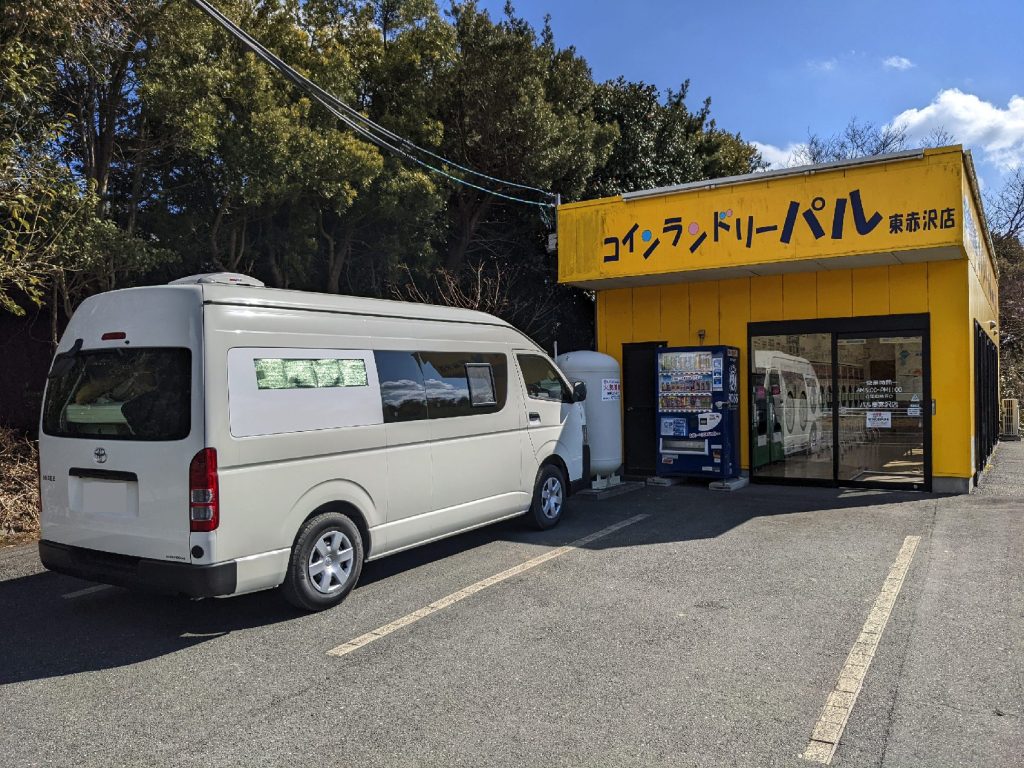
🍛 Food?
We often skip breakfast and just enjoy a cup of coffee. The drip bags are super convenient to use as we only have to make hot water and take a cup out. Those single-use coffee sets are amazing for camping in general.
At lunch, we often eat at restaurants. Japanese restaurants often offer cheap sets full of different ingredients. They are often cheaper than what you’d pay for buying everything plus you can relax and discover new foods from different prefectures..
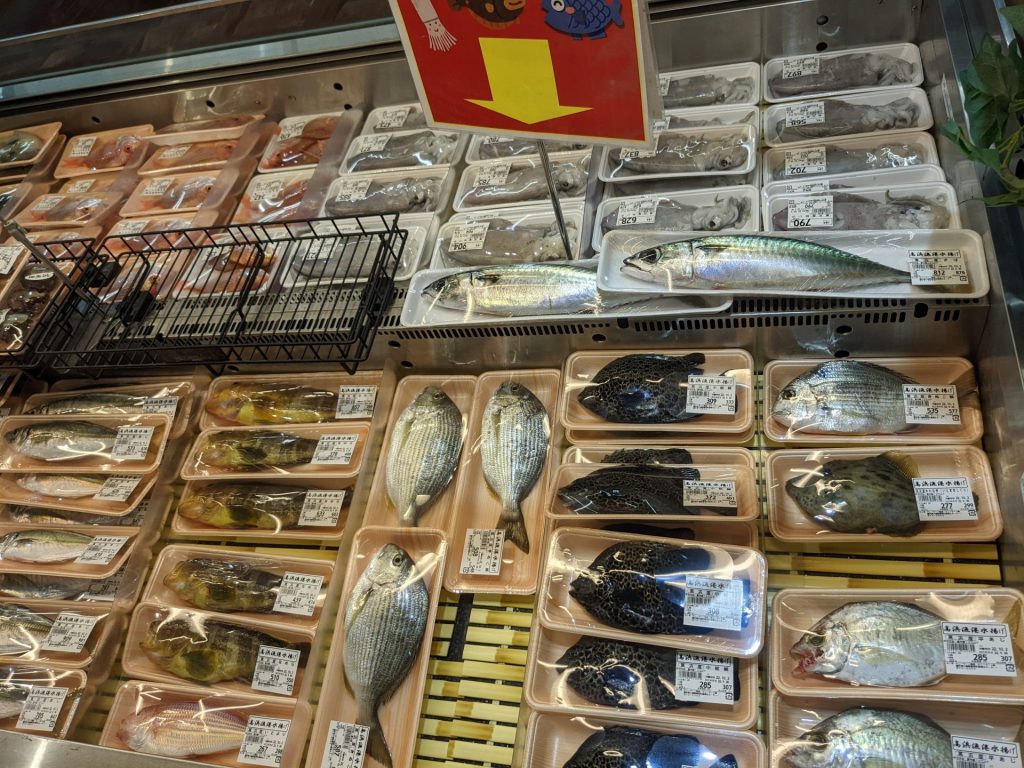
In the evening we always cook inside the van. In Japan, sunset is pretty early compared to the rest of the world so we enjoy long evenings relaxing, cooking, and eating with the family. We mainly used one pan, a Staub pot, a small rice cooker, and a portable gas stove.
One useful tip to save cooking time is to cut a lot of vegetables and put them together with different meat/spices in several Ziplocs in the fridge. It reduces cooking time and storage space as every meat/fish is always packed in a lot of plastics. You can then eat for a few meals just by cooking the content of your ziplock in the pan and mix with some rice.
👮 Safety?
We never had any issues with safety as opposed to Europe where I would dare to let a laptop and camera in a car. While sleeping in normal parking I think it is important to keep discrete so people will not bother you and you will not annoy anyone.
In Japan, safety needs special care when it comes to nature. Keep in mind that earthquakes and heavy rains can be quite dangerous and you should always know how to get to safety when you arrive in a new spot or not stay in your car during strong conditions.
In some areas, it is also important to keep an eye on wildlife: Japan has a lot of bears, monkeys, snakes, and insects you should keep an eye on.
☀️ Climate?
Most of Japan is best visited from September to November and March to July. Summer can be really hot unless you go to the alps or Hokkaido (north) and winter can be really cold, especially in January/February. During those summer months, we traveled back to Europe and plan to stay in some hot places during the early year (January/February).
It is important to have a heater in your van (like a Webasto) for enjoying January to March and good ventilation for the rest of the year (MaxFan).
As specified inside of the safety part: it is essential to monitor weather events such as typhoons as they can be dangerous for people and goods.
👶 Living with a child?
Before moving into our van I thought that would be the only reason for our experience to fail. But kids are amazing at adapting to any environment!
Being 3 in such a small place is a challenge but has also a lot of benefits. While a growing kid that starts to walk, discover things will touch everything and try to make experiments when you just want to have some sleep or a safe drive. But that’s the same at home… It has been an amazing gift to be able to let our child explore nature, and walk on beaches every morning while we drink coffee.
Being all 3 together in such a small place is challenging but helps us be more connected to each other.
💻 Work?
I do work as a software engineer remotely. Fortunately, I love what I’m doing and I am my own boss so I can adapt my workload to our rhythm. I don’t hesitate to enjoy nice places/weather while working a lot; early in the mornings while the girls still sleep, and when we settle somewhere. I would honestly not recommend living in a van with family if you can’t arrange your work schedule completely to what you want.
🚗 Driving?
Driving in Japan is really smooth. People are less aggressive than in Europe, directions are available nearly everywhere in English and Google Maps works great! You can access a lot of remote places by car and often be able to drive/park on beaches.
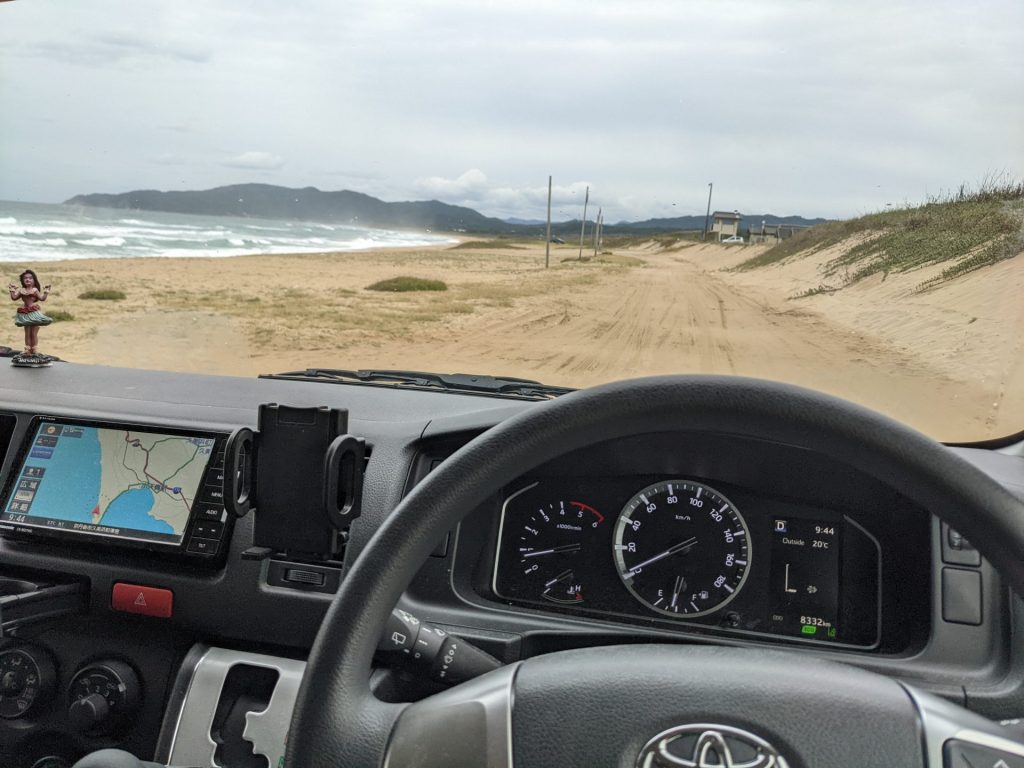
We rarely use the freeway in our daily life as we enjoy taking time, but you should definitely have an ETC card that enables paying tolls without stopping: also some entrances/exits are ETC only.
A van/RV can be quite challenging to drive through some narrow countryside roads/towns. It’s important to always take time and not feel stressed and you’ll manage to get anywhere safely.
Also when using Google Maps in the countryside: if you happen to make a mistake it is often better to directly do a U-turn as the navigation often tends to correct your mistake by making you go through sketchy/narrow roads
🏕️ Favorite campsites/parking?
- Beach campground in Hamada, Shimane 🏄♂️
- Katazoegahamakaihinkoen, Yamaguchi 🏄♂️
- Okuragahama surf spot, Hyuga, Miyazaki 🏄♂️
- Niinohama beach, Yamaguchi 🏄♂️
- Tanabe-Kawayu Camping Ground, Wakayama 🌲
⛽ Gas?
Our van uses diesel and averages 10.5km/L with a 580km range which is not that bad considering the power, size, and weight. We never had any problem finding diesel even in remote places.
🛒 Must have equipment?
Here is some stuff we used daily and recommend getting:
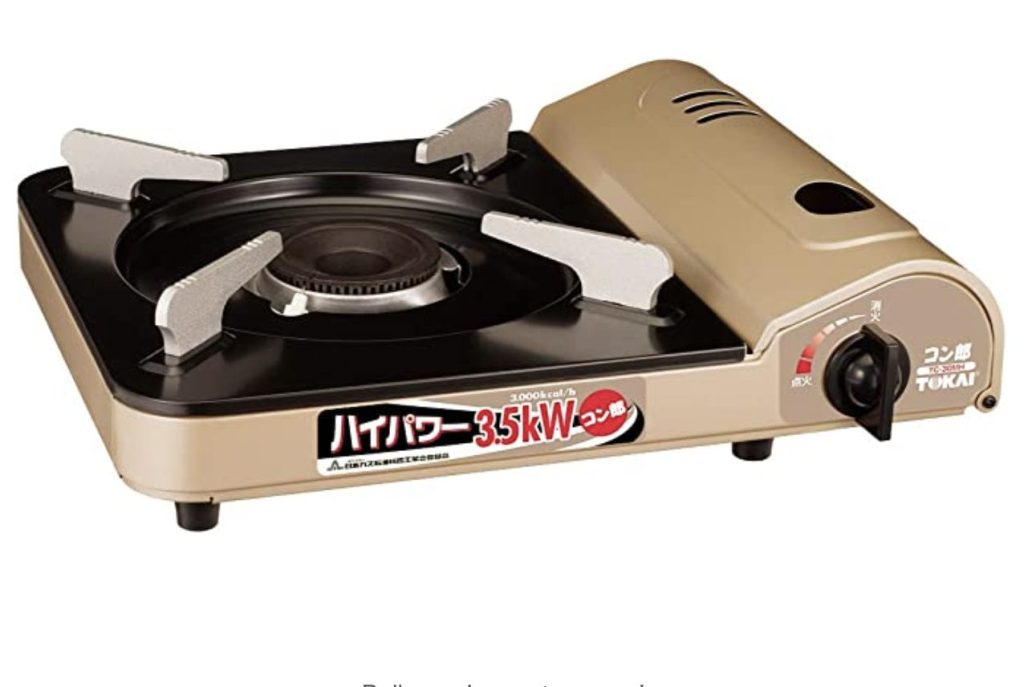
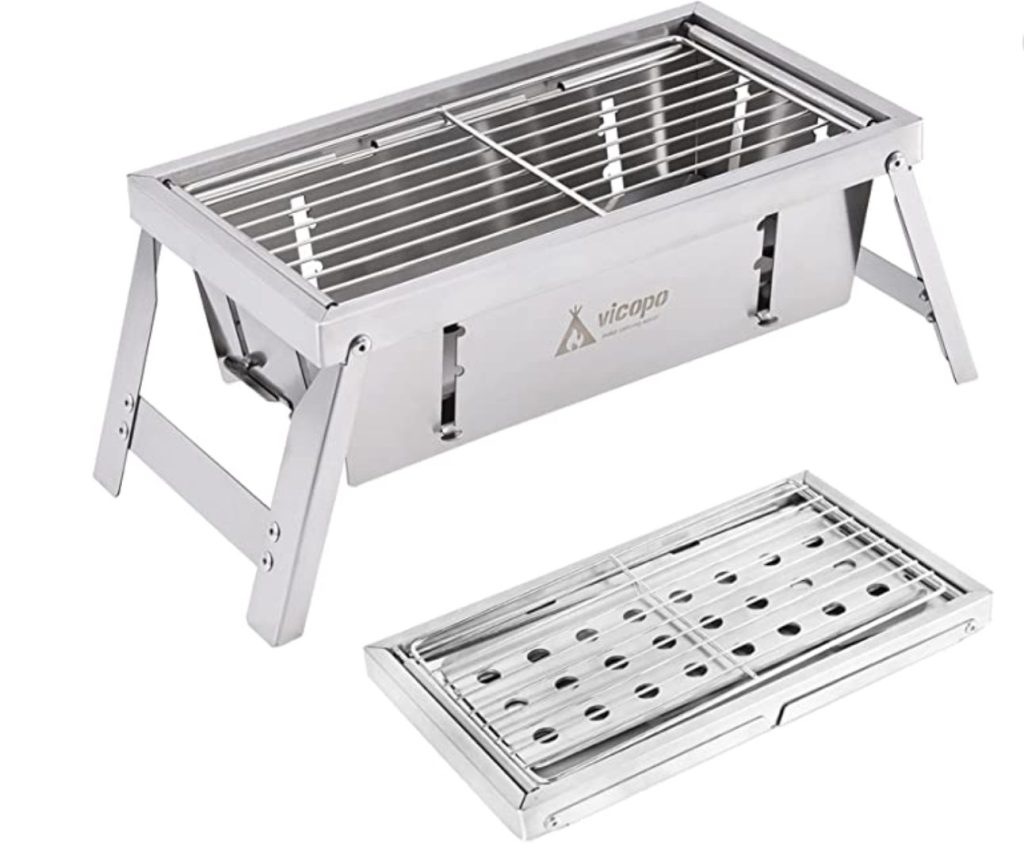
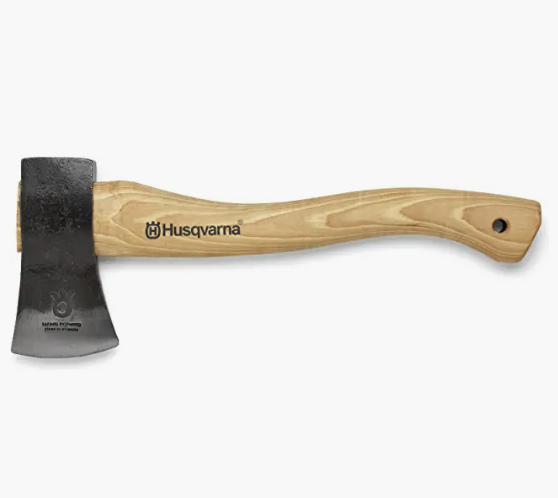
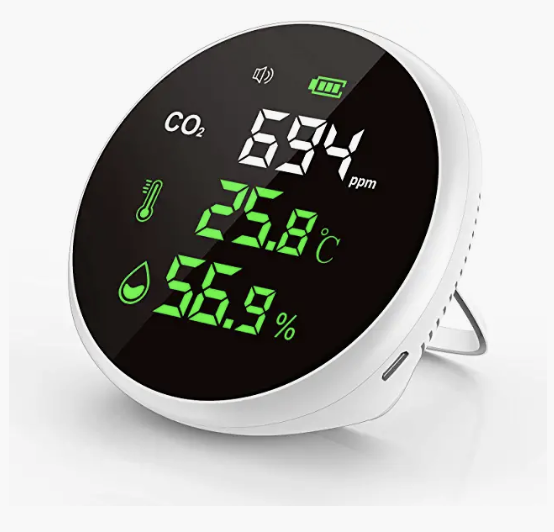
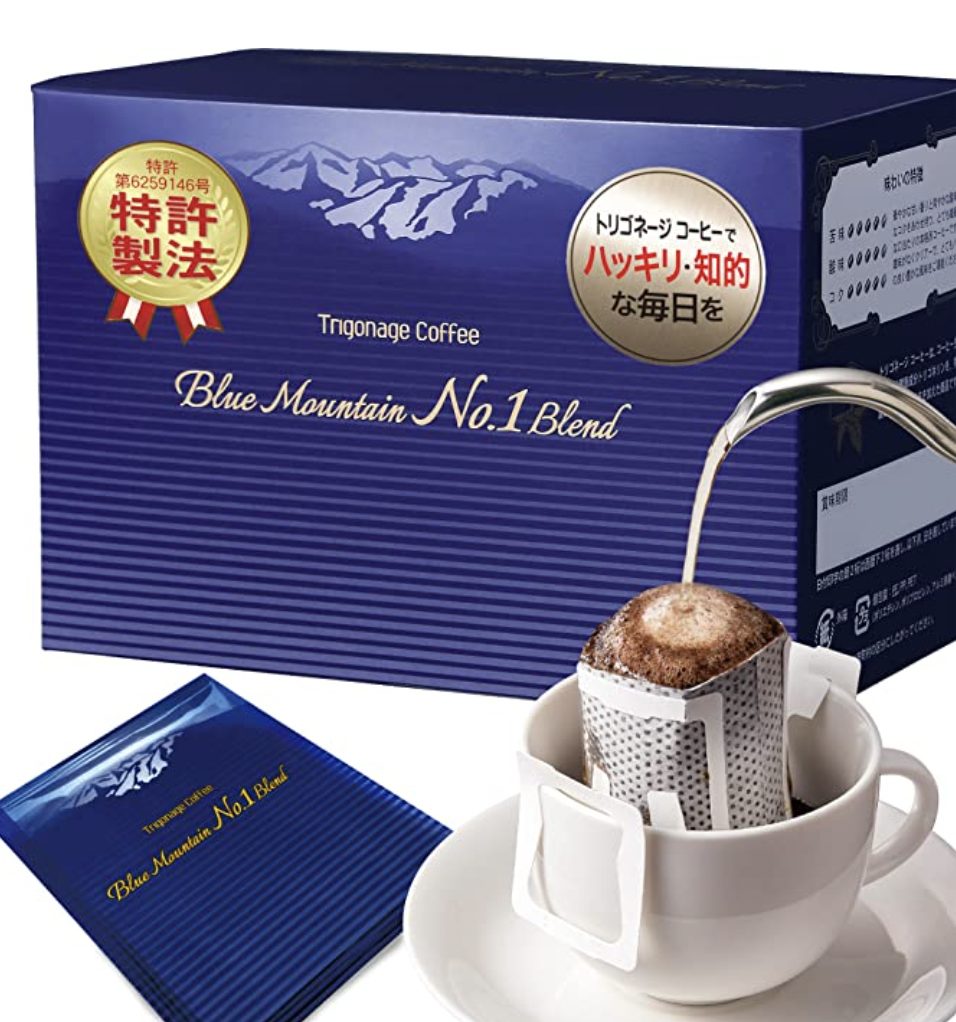
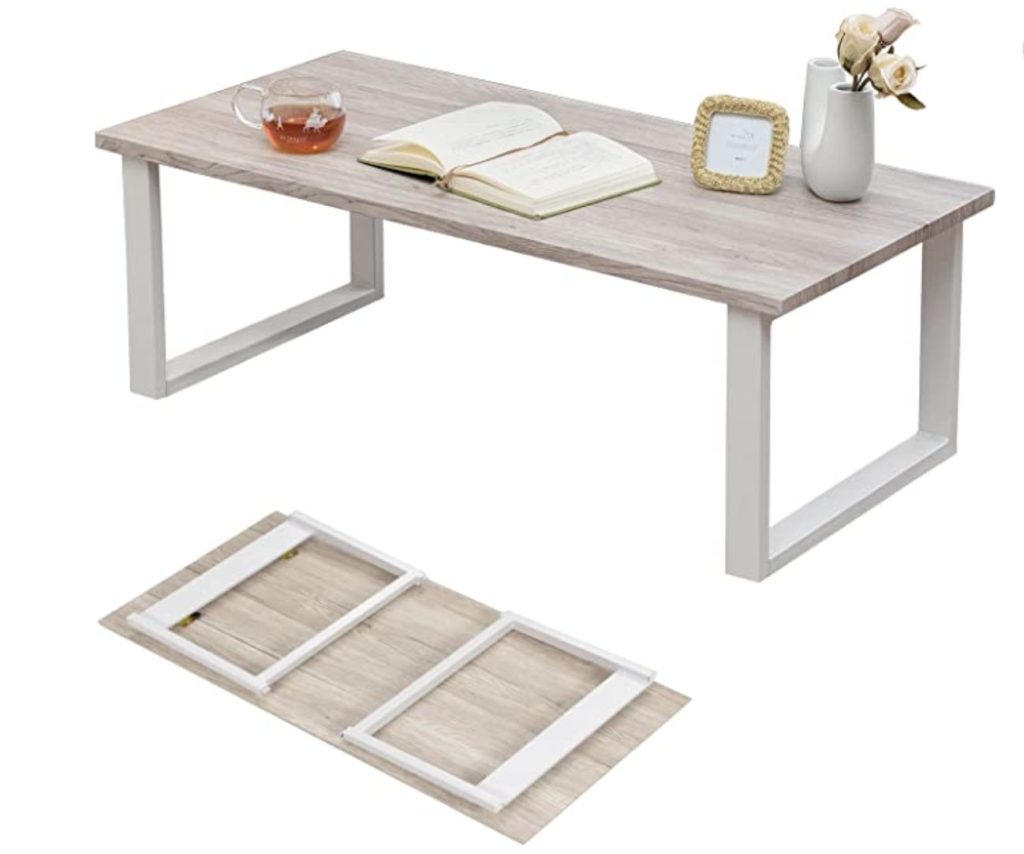
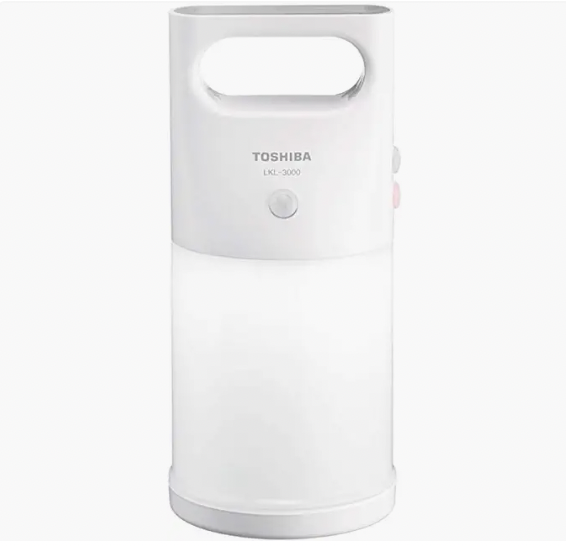
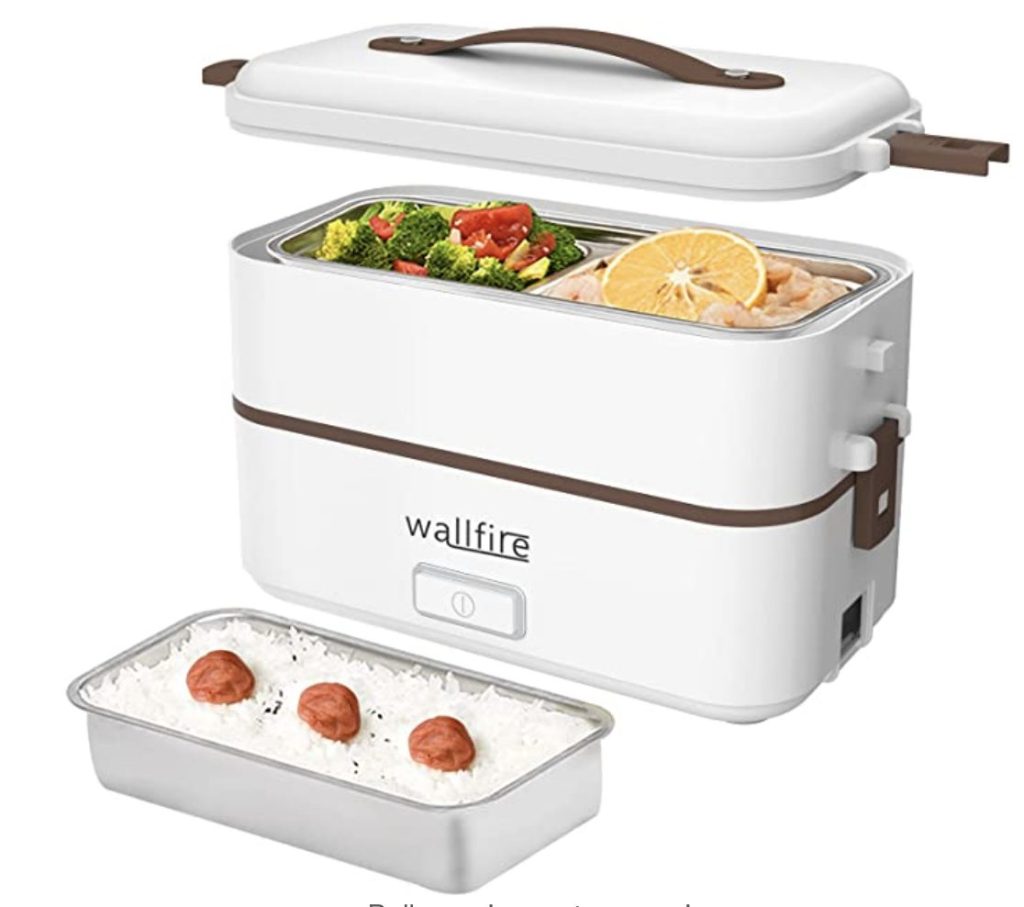
🌊 Surfing?
We carried two inflatable surfboards from Decathlon. One surf SUP and a 7’6 normal board. While the sensations are different from normal surfboards they are pretty convenient to carry without having to put them on the roof.
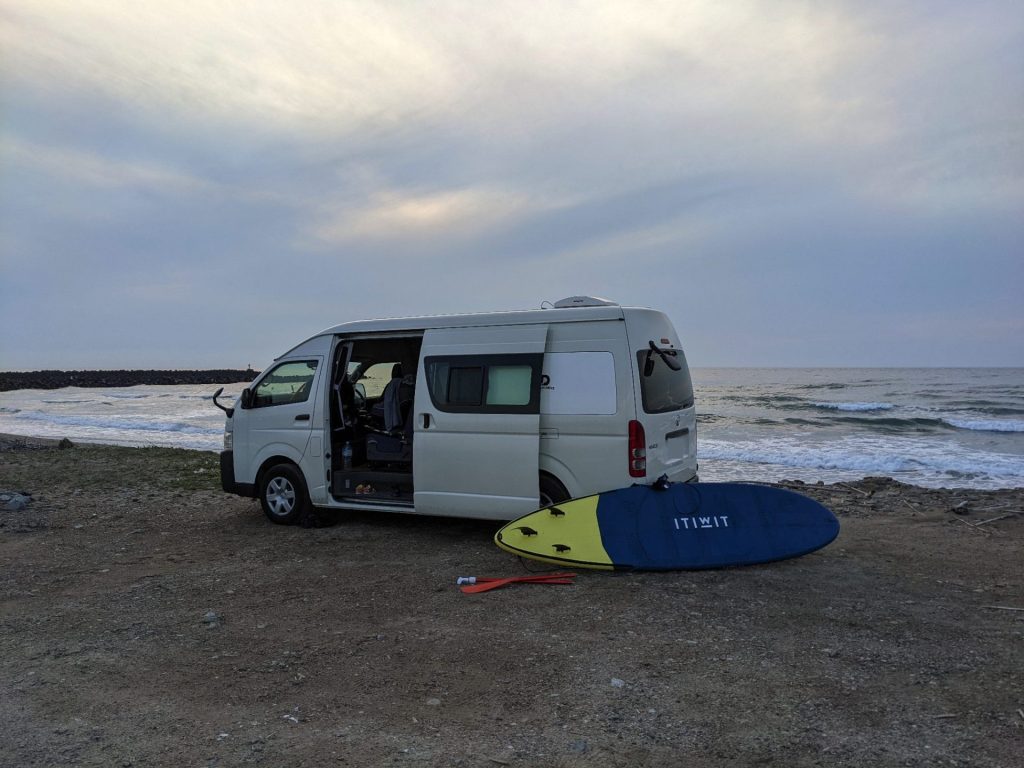
Japan offers a wide variety of waves along the coasts and I was lucky to surf in the prefectures of Miyazaki, Kagoshima, Oita, Shimane, Mie, Wakayama, Kanagawa, Tottori…
🔑 Renting?
If you’re looking to visit Japan for a few weeks or want to experience a unique weekend, the company that built our van: Dream Drive offers the rental of equipped vans from Tokyo and has good support for English-speaking customers.
🎎 Is van life popular in Japan?
There are actually a lot of people using camping cars and vans in Japan. While traditional camping is really popular with young people. Camping-car users are mostly retired people and can be mostly encountered in michi no eki across Japan. This way of traveling got even more popular with the Coronavirus as people try to avoid contact with others and are also popular for people owning dogs as there are few hotels allowing animals.
During weekends and national holidays, it can be hard to find space in popular parking and campgrounds.
🎥 Discover on Youtube?
There are some nice content creators on Youtube showing how it is. I can recommend a few:
📝 Paperwork?
If you live in Japan you’ll need to register an address. One thing unique to Japan is that you’ll need to have or rent a parking space in order to buy a vehicle. In our case, we had the luck to be able to register our address and vehicle at some family address.
You’ll also need insurance for your car, we used Tokio Nishido Marine which also offers support in English.
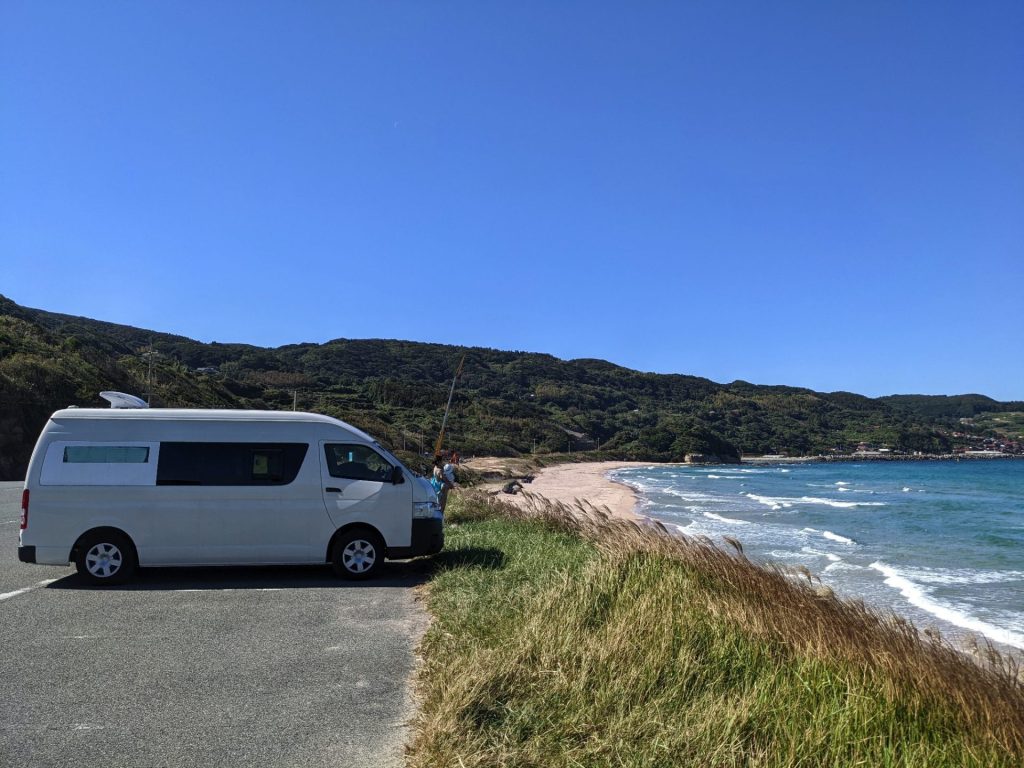
🕊️Freedom?
Japan might be one the best country for van life in the world. It is because you get complete freedom on where you sleep and don’t have to worry about safety. This freedom has a price and comes with having to respect your surrounding at all times. Japanese culture has a lot of rules and as foreigners (from a different country or even Japanese from different areas) it is important to not bother others, keeping things cleaner than when you found them, offering a smile or a delicate bow…
You’re living life on the road in Japan and want to chat? Feel free to contact me. If you have additional questions I may not have answered yet, feel free to let me know in the comments.
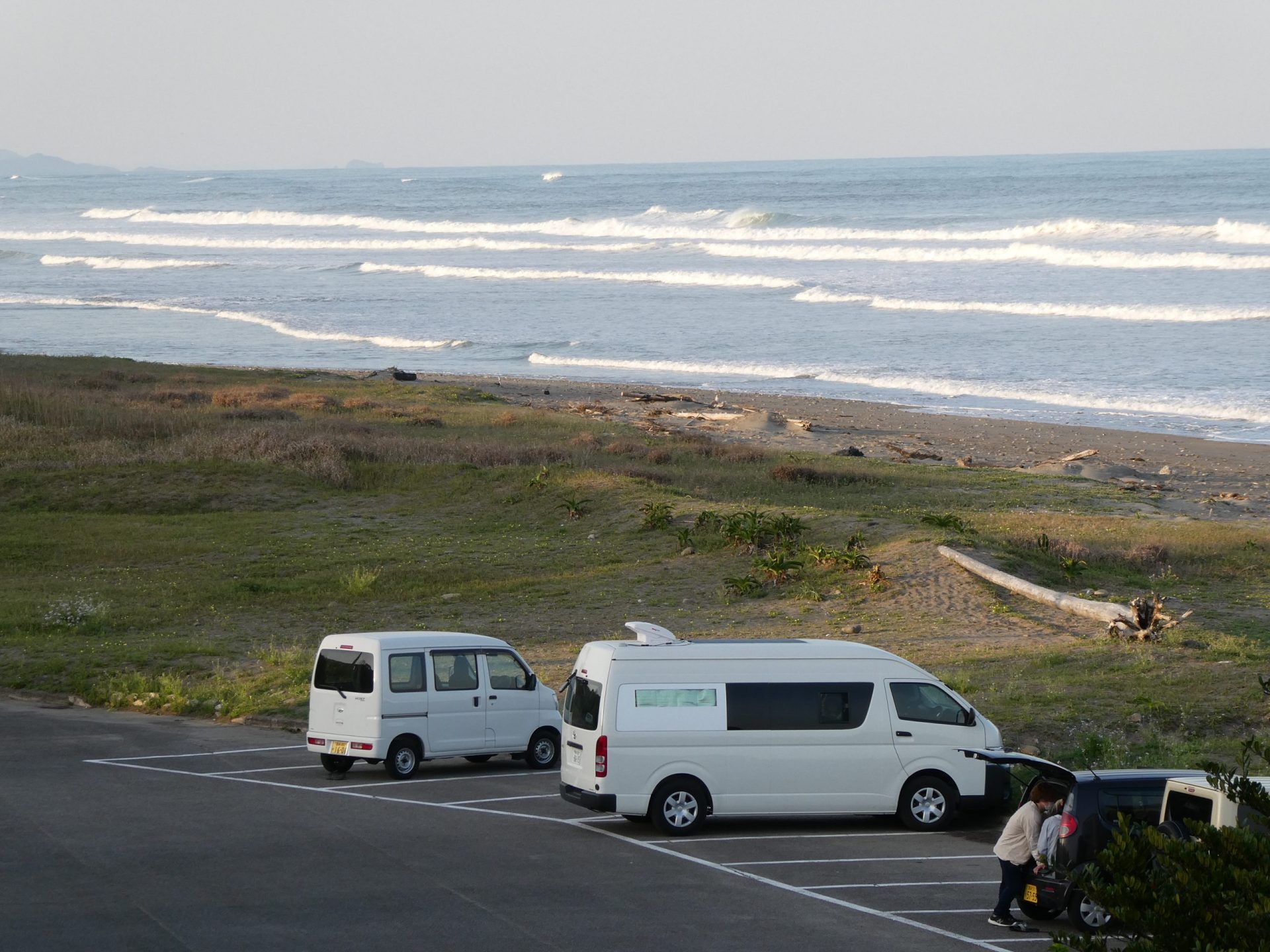
A fellow American (from the Great Lakes area like me) that runs a VERY successful “van life style” Youtube channel is/was in Japan for a 4 week trip doing exactly this.
https://www.mavmadeit.com/
https://www.youtube.com/channel/UCL_BZpt0J9Kqwy6YPWr30ow (youtube channel)
Reach out and see if he’s there! Otherwise, really killer dude to follow.
Awesome! I love his channel <3 will see if he's still there and where
For coffee try an Aeropress. No mess and much better taste than single use drip.
Thanks for great info.
Will give it a try 😉
I really enjoyed this post, you are a great blogger. Keep it going!
Thank you 🙏
How about resident registration and receiving mail?
Thanks for writing — I consider this lifestyle too!
We registered everything at some family. Will add a section on it soon 👍
What is the cost for rv/van rental in japan, if we dont ship our own van to Japan for use?
A rental van/RV can go from 150 to 250 USD per night.
I never saw foreign vehicles on the road in Japan and I am not aware of how importing works but I’d guess it must be quite intensive in paperwork/cost.
Super cool! We also drove 20000 km with our Hiace, the best time of our lives.
My tips:
– set google to avoid motorways
– we use an app with offline map to find campsites, onsen and michi no eki – it was super useful
https://apps.apple.com/gb/app/michi-japan-road-guide-offline/id1381040242
Thanks John! Added the app with some other resources I forgot in the article.
Nice article!
How do you do for internet? Mobile network coverage is great in most places in Japan but I would be concerned about data cap, especially for work
Thank you! Data coverage is insanely good. We have 2 Docomo 100gb plan and only few times reached the level of being throttled. When needing to download big data we often went to coffee that offers free WiFi.
Noted thanks 🙂
This was a super inspirational post for me to dream about as a tech remote employee in the US, thank you for sharing!
Hi there, we lived in Japan for 8 years, our oldest was also born there and now that he is 14 and our daughter, who was born in Berlin 11, we want to come and visit our family roots – the Chikushi area in Kyushu. Would love to spend some time traveling with a van around in the countryside… would you be so kind to send us some tips where we could rent such a thing (apart from budget-rent-a-car stuff)? Couldn’t find any portals for that!? Maybe still too underground in Japan? Would truly appreciate if you could connect us to any van life people who have an idea where to rent one for about 2 weeks. thank you so much! would also love to visit old, vacant, transformed buildings and projects like an empty school turned into a community coliving project… this kind of thing. I do that in Germany if you like to have a look and are interested in connecting to that, too https://wissen.zukunftsorte.land/orte
Hi there,
Thanks so much for the post, it was really informing. I’ve just moved to Japan, and am looking to purchase a second hand van similar to yours. Do you know if there are any websites/FB pages that sell second hand vans similar to yours?
Cheers
Hey you can check here https://www.fujicars.jp/search2.php?view=1&sort=publish2&keyword=
Or they sometimes have some second hand ones on the dream drive website.
Not aware of other places but it must exist, feel free to share if you find ❤️
Have fun!
Bonjour,
Merci pour votre super témoignage !
Je voudrais faire une vanlife avec ma chienne en PVT au Japon l’an pro.
Est-ce possible de faire une vanlife avec ma chienne ? Je voudrais y partir 6 mois – 1 an.
Peut-on louer un van aménagé avec un chien ?
Connaissez-vous des sites / endroits où on peut acheter et revendre son van aménagé svp ?
Merci,
Bonne journée
Beaucoup de Japonais voyagent en van car ils ont des chiens qui ne sont pas souvent accepte dans les hotels.
Pour acheter/vendre:
https://www.fujicars.jp/search2.php?view=1&sort=publish2&keyword=
https://www.dreamdrive.life/used/
Les locations acceptent surement les animaux de compagnie mais je n’ai pas beaucoup d’infos supplementaire.
Bonne journee et bonne aventure!
Hi Kuma
We travel a lot in Europe in our VW California, with 2 bikes on the back, and go cycle touring most days.
I’m looking but finding it really hard to find a van hire place in Japan that will include a bike rack. Just one firm can offer, but without any insurance because they are dangerous.
Any thoughts were I could look besides my Google searches.
It seems Dream Drive don’t do rentals anymore : (
Hi and sorry for late reply!
I heard some people could find van with bike holders on this website https://carstay.jp/en
Thanks so much for sharing! My partner and I are coming to Japan on working holiday, and want to live in a van. It seems like the rules can be quite confusing. If we have a yellow plate, we don’t need a registered parking spot? Also, since we are planning to live in our van, we won’t have an address. Any tips on this? Thanks so much!
Sorry I’m not sure about the regulations here and would love an update if you find answers so I can improve the article.
In my experience you’ll need to have an address to register your citizen card also.. we did through family but maybe you could do through rental address for businesses as some business offer business to register mail address somewhere?
Pingback: Japan Travel Guide: A list of the best travel guides and blogs on Japan
Hi 👋 there,
I am about to start my experience with a camper Van I brought from Switzerland in Osaka area.
Any advice about good locations to stay overnight?
I’m curious on how did you bring it? Is it registered now in Japan or are you just travelling? This campground was amazing!
Hi Kuma, We are a family of five going to Japan this coming end of Nov till mid Dec. We rent a High roof Hiace campervan. We never experience winter for such long time before. Can we sleep warmly in campervan in winter? My car rental man said we can charge the battery in every Michi No Eki, is it true? Thank you in advance for your answer.
Hey. Not sure you can charge your RV batteries in most michi no eki but campings usually have power. I was relying on solar panel and diesel heater.
Until mid December cold should not be a big issue but really depends on where you plan to go
Hello, our family of 5 are planning a trip to japan alps in early October (kamakuchi, kiso valey..) We do not have van/japan driving experience, and i’m concerned of narrow and difficult to navigate roads, parking space.. thanks for this great blog! Hila
It will be good, just take your time to familiarize with the length especially for turning 😉
So glad I found this gem of a blog. Did you find a place in Japan to settle down? It’s amazing how you were able to do it while having a kid. That makes me less anxious as I don’t have a kid to worry about looking after if I do get a camping van.
Would you recommend me to buy a camping van? Currently living in Japan but the biggest issue would be registering a parking space which I heard has to be 2km of your residential address?
Thanks for the kind words. The van life in Japan is amazing and I miss it as I settled in Miyazaki prefecture. But occasionally do weekends/small weeks now.
I’m not sure about the registration of parking laws but if you’d really wanted you could rent a super cheap space in the country side and register there. I also talked to someone that was thinking about registering it as part of a company that can be more flexible… But don’t know what he chose in the end.
Hi guys,
Thanks a lot for this very nice website.
We are looking into a campervan trip in Japan combined with 2 citytrips in accomodation. So 1 week Kyoto, 1 week tokyo and 6 to 8 weeks campervan. We can leave mid august the earliest and are aiming to leave mid august to end of august.
We also want to travel in south Korea for a couple of weeks by public transport.
We can’t have overal good weather ( dry and not to cold) everywhere…but I am soooo scared of being cold. I can handle it very bad. So basically I am afraid of being cold at night sleeping in the van. What’s your experience with weather in september, oktober and early to late November?
Also, I don’t know if you are familiar with south Korea. It seems to lie more north than central Honshu island and everything south to that….so my idea is that south Korea should be colder then.
So it freaks me out to visit south Korea after our Japan road trip….but it would leave us with more flexibility since we would be attached to a south Korea end dare (travelling by public transport) opposed to starting our Asia trip in south Korea and having to be in Japan to pick up the van ( fixed date)
Any input would be appreciated. Maybe I am freaking out over nothing. We survived Kathmandu valley in january/February, winter. This rubber hot saved me
All the best,
Ellen and Bjorn from belgium
September to December is the best period in my opinion. Not too hot and not too cold 😉
Thanks for the great article! I’m living in Tokyo. My girlfriend and I are planning to rent a van and do some exploring. I really appreciate all the great tips on your article. Cheers!
Thank you for a great and very useful post!
My partner and I and our daughter (10 months old at the time of travel) are going to Japan for a 3-weeks trip in mid-March where we have rented a campervan. Do you use a specific app or website to find the free public parking spots?
And would you recommend a heater in the van when traveling in March? (Our pick up will be in Tokyo and drop off in Osaka – we have no specific plans for where to go yet).
Thanks!
I use Google maps mainly, searching for free parking with toilets.
March should be okay without heater if you dress good at evening and have a good blanket.
May I ask if I get a large RV for my family (something the size of 7-8meters), does that pose significant issues with parking?
I see you say you park at public parking spaces most of the time, but if the RV is large, do people allow you to park?
What do you use to find campsites in Japan?
If you stay put of big cities and crowded place you will be okay but it’s definitely better to be around 6M..
I mainly use Google maps but I’m currently developing a website to search and share more easily..